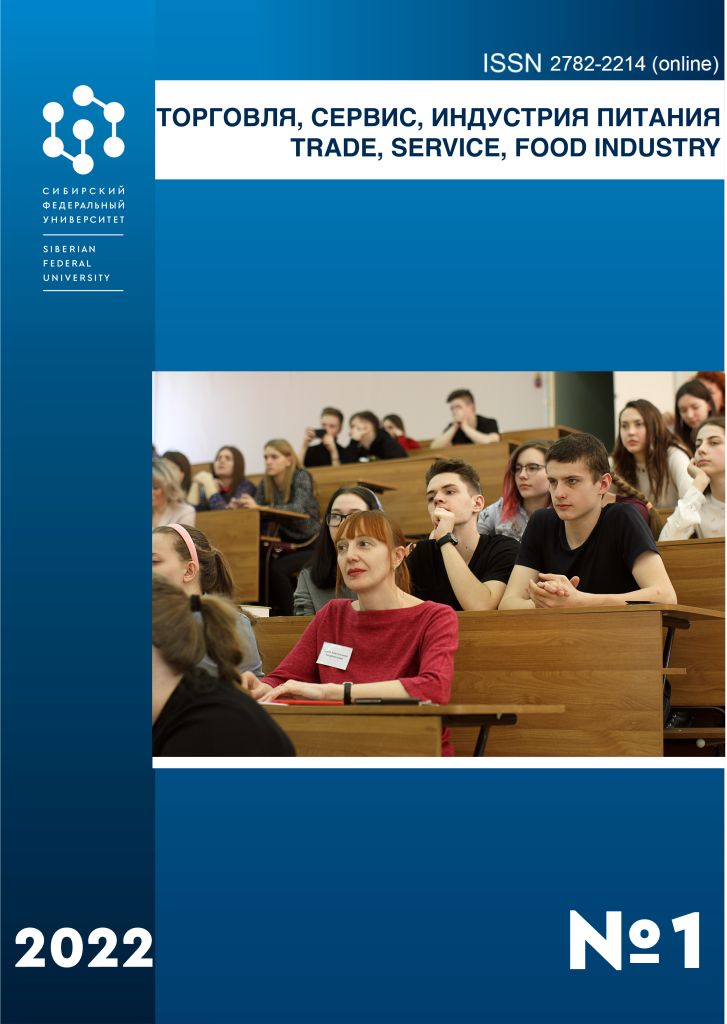Krasnoyarsk, Krasnoyarsk, Russian Federation
UDC 334
This article is devoted to the study of models of economic relations management in the activities of an educational cluster. The authors investigate a set of management models based on a theoretical review and identify those that can be used in the activities of an educational cluster at the municipal level. The cluster of educational services is considered on the example of a municipal autonomous educational institution on the territory of Krasnoyarsk, forming a complex of interacting participants characterized by geographical connectivity.
management model, educational cluster, economic relations, sharing economy, services
1. Ananina, R.F. The importance of breakthrough innovations in the economy of shared consumption. In: Regional consumer goods markets: quality, environmental friendliness, business responsibility. December 10-11, 2020. Ed. by Yu.Yu. Suslova. Krasnoyarsk: Sib. feder. un-t, 2021. Pp. 568-572.
2. Ananina, R.F. The role of services in the structure of cooperative network interactions. In: Economics and entrepreneurship. 2019. 1 (102). Pp. 1219-1224.
3. Ananina, R.F. Transfer of services in the economy of shared consumption: features of development during the pandemic. In: Theory and practice of commercial activity: collection of materials of the XX International Scientific and Practical Conference, May 12-14, 2020. Krasnoyarsk: Sib. feder. Univ., 2021. Pp. 204-209.
4. Belokonev, S.Yu., Dudin, M.N., Khokonov, A.A. Influence of joint consumption and network information technologies on social processes. In: Economics, Entrepreneurship and Law. 2019. 9(4). Pp. 445-462.
5. Dneprov, M.Yu., Mikhailyuk, O.V. Digital economy as a new economic category. In: Issues of innovative economy. 2019. 9(4). Pp. 1279-1294.
6. Dorrer, G.A. et al. On the experience of network interaction in educational activities of universities in Krasnoyarsk. In: Open Education. 2015. №5 (112). Pp. 63-68.
7. Zakharov, V.Ya., Trofimov, O.V., Frolov, V.G. Mechanisms of integration and cooperation of complex economic systems in accordance with the concept of "Industry 4.0". In: Issues of innovative economics. 2019. 4. Pp. 1341-1356.
8. Katkalo, V.S. Inter-firm networks: problems of research of a new organizational strategy. In: Bulletin of SPbU. 2004. Ser. 5. 2(12). Pp. 21-38.
9. Kuimov, V.B. Economics of cooperative-network interactions. Theory. Practice. Opportunities. Moscow, 2019. 220 p.
10. Osmanova, Z.O. The economy of shared consumption: features, structure and development trends. In: Scientific Bulletin: finance, banks, investments. 2020. 3(52). Pp. 176-184.
11. Pitersma, P. Key management models. 77 models that every manager should know Moscow, 2019. 400 p. (in rus).
12. Tagarov, B.J. Digital cluster as a new form of economic concentration. In: Creative economy. 2021. 15(2). Pp. 327-340.
13. Sheresheva, M.Yu. Forms of network interaction of companies. Moscow, 2010. - 46 p.
14. Botsman, R., Rogers, R. What’s mine is yours: The rise of collaborative consumption. New York: Harper Collins, 2010. 304 p.
15. Constantiou, I., Marton, A., & Tuunainen, V. K. Four Models of Sharing Economy Platforms. M I S Quarterly Executive. 2017. 16(4), 231-251.
16. Hamari, J., Sjöklint M., Ukkonen, A. The Sharing Economy: Why People Participate in Collaborative Consumption. In: Journal of the Association for Information Science and Technology. 2016. 67. Pp. 2047-2059.
17. Rother, M., Shook, J. Learning to See: Value stream mapping to add value and eliminate muda. Cambridge, MA: Lean Enterprise Institute, 2003.
18. Van den Berg, G., Pitersma, P. The Grand Book on Strategy. Den Haag: SDU, 2012.
19. Van den Berg, G., Pitersma, P. The 8 Steps to Strategic Success: Unleashing the Power of Engagement. London: KoganPage, 2014.
20. Zervas, G., Proserpio, D., Byers, W. The Rise of the Sharing Economy: Estimating the Impact of Airbnb on the Hotel Industry. In: Journal of Marketing Research. - 2017. 5. Pp. 687-705.








